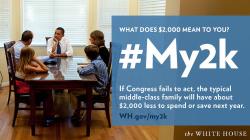Tags
Fiscal Cliff, JACL, LCCR, My2K
 Last week I attended a National Board Meeting of the Leadership Conference on Civil and Human Rights (LCCR). In 1950, JACL made a bold decision to help found this coalition in the belief that civil rights would not be won by one group alone. The alliance was started by 30 organizations under the leadership of A. Phillip Randolph, head of the Brotherhood of Sleeping Car Porters; Roy Wilkins of the NAACP; and Arnold Aronson, a leader of the National Jewish Community Relations Advisory Council. This coalition may not seem avant garde today, but it was a vision of a future that did not have currency in a Cold War America. JACL remains on the Executive Committee of LCCR. Today, there are over 200 national organizations that make up LCCR.
Last week I attended a National Board Meeting of the Leadership Conference on Civil and Human Rights (LCCR). In 1950, JACL made a bold decision to help found this coalition in the belief that civil rights would not be won by one group alone. The alliance was started by 30 organizations under the leadership of A. Phillip Randolph, head of the Brotherhood of Sleeping Car Porters; Roy Wilkins of the NAACP; and Arnold Aronson, a leader of the National Jewish Community Relations Advisory Council. This coalition may not seem avant garde today, but it was a vision of a future that did not have currency in a Cold War America. JACL remains on the Executive Committee of LCCR. Today, there are over 200 national organizations that make up LCCR.
The board meeting provided a glimpse into the challenges of 2013. Here in D.C., discussions start and end with the impending fiscal cliff. One of the most provoking statements came from Vanessa Cardenas, Director of Progress 2050. She opined that our success in moving civil rights issues hinge on the President’s ability to tackle the fiscal cliff. The fiscal cliff hasn’t become a critical issue for many Americans – I think Y2K caused more apprehension than the fiscal cliff. However, the issue has the potential to change the landscape of our daily lives. It deserves our attention and our participation. If the President fails to overcome the fiscal cliff issue, I believe that any effort to move forward on a wide range of progressive issues will be significantly diluted.
Voting rights will continue to be a battleground. This election saw the return of practices that have not been used since the passage of the Voting Rights Act of 1965. The post-Reconstruction tactics that were directed at minority voters were a challenge to the Voting Rights Act – as LCCR President Wade Henderson said, voting rights have to be embedded not only in election-year priorities, but also in our daily priorities. Comprehensive legislative reform is also needed to address immigration issues. Immigration reform cannot be about providing laborers, but about family unity and creating pathways to citizenship.
The Obama administration has had difficulty moving judicial nominations, and there are more than 100 current or future vacancies in the judiciary. A new four-year administration for the President increases the likelihood he will have an opportunity to impact the balance of the U. S. Supreme Court elevating the importance of the President’s ability to get his nominees confirmed. Rounding out LCCR’s focus in the coming year are education reform, criminal justice reform, and addressing poverty. Of interest is that LCCR echoed a message that Congressman Mike Honda has been delivering on treating education as a civil rights issue.
 The White House is making a valiant effort to amplify the voices of everyday Americans in their fight to resolve the fiscal cliff issue. The President is asking as many Americans as possible to add their voice to the debate by speaking out about what a $2,000 tax hike would mean to them. So share your story or speak out on twitter using the hashtag #my2k and copying @WhiteHouseAAPI.
The White House is making a valiant effort to amplify the voices of everyday Americans in their fight to resolve the fiscal cliff issue. The President is asking as many Americans as possible to add their voice to the debate by speaking out about what a $2,000 tax hike would mean to them. So share your story or speak out on twitter using the hashtag #my2k and copying @WhiteHouseAAPI.
